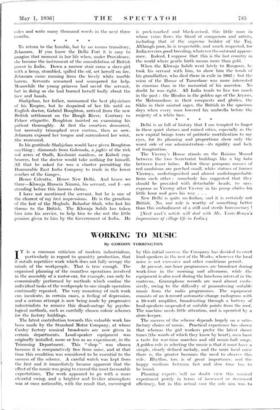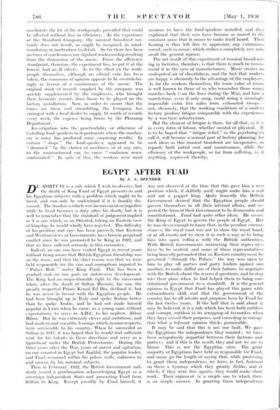WORKING TO MUSIC
By GORDON TORRINGTON The latest contribution towards this valuable work has been made by the Standard Motor Company, at whose Canley factory musical broadcasts are now given in certain departments. Loud-speaker equipment was originally installed, more or less as an experiment, in the Trimming Department. This " shop " was chosen because it is comparatively free from noise, and at that time this condition was considered to be essential to the success of the scheme. A careful watch was kept from the first and it immediately became apparent that the • effect of the music was going to exceed the most favourable expectations. The work appeared to go with a more cheerful swing, and a brighter and livelier atmosphere was at once noticeable, with the result that, encouraged by this initial success, the Company has decided to erect loud-speakers in the rest of the Works, wherever the local noise is not excessive and other conditions permit.
At present, one-hour programmes arc broadcast during work-time in the morning and afternoon, while the equipment is also used during the luncheon interval in t he canteens. Gramophone records arc used almost exclu- sively, owing to the difficulty of guaranteeing suitable music from the radio programmes. The equipment consists of an 8-record automatic-change radiogram with a 10-watt amplifier, broadcasting through a battery of loud-speakers suspended at suitable points from the roof. The machine needs little attention, and is operated by a store-keeper.
• The success of the scheme depends largely on a satis- factory choice of music. Practical experience has shown that whereas the girl workers prefer the latest dance tunes (the words of which they know by heart), men have a taste for war-time marches and old music-hall songs. A golden rule in selecting the music is that it must have a simple, clearly defined melody, and the more local noise there is, the greater becomes the need to observe this rule. Rhythm, too, is of great importance, and the happy medium between fast and slow time has to be found.
Planning experts will no doubt view this musical experiment purely in terms of increased or decreased efficiency, but in this actual case the sole aim was to ameliorate the lot of the workpeople, provided that could be effected without loss in efficiency. In the experience of the Standard Company, the musical broadcast cer- tainly does not result, as might be imagined, in mind- wandering or inattention to detail. So far there has been no trace of carelessness nor slipshod workmanship resulting from the distraction of the music. From the efficiency standpoint, therefore, the experiment has, to put it at the lowest, had no ill effects. As to the effect on the work- people themselves, although no official vote has been taken, the consensus of opinion appears to be overwhelm- ingly in favour of a continuance of the music. The original stock of records supplied by the company was quickly supplemented by the employees, who brought their favourite records from home to he played on the factory installation. Now, in order to ensure that the. tunes are fresh and stimulating, the Company has arranged with a local dealer to supply worth of records every week, the expense being borne by the Planning Department.
Investigation into the practicability or otherwise of installing loud-speakers in departments where the machin- ery is noisy has produced some surprising results. In certain " shops " the loud-speakers appeared to be " drowned " by the clatter of machines, or at any rate, to the unaccustomed ear, to cause " confusion worse confounded." In spite of this, the workers were most anxious to have the loud-speakers installed, and they explained that their ears have become so inured to the constant noise that it ceases to make itself heard. Their hearing is thus left free to appreciate any extraneous sound, such as music, which strikes a completely new note amid the general uproar.
The net result of this experiment of musical broadcast- ing in factories, therefore, is that there is much to recom- mend it in the eyes of manufacturers. Music creates an undisputed air-of cheerfulness, and the fact that workers are happy is obviously to the advantage of the employers. As for the workers themselves, the tonic value of music is well known to those of us who remember those weary marches back ffani the lines during the War, and how a march-tune, even if only sung, could wring a seemingly • impossible extra five miles froM exhausted troops— not, obviously, that the working conditions of a modern factory produce fatigue comparable with the experiences by a war-time infantryman.
But the element of fatigue is there, for all that, as it is in every form of labOur, whether mental or physical. It is to be hoped that " fatigue relief," as the psycholog's:s call it, will become a normal part of factory planning, for such ideas as this musical broadcast are inexpensive, as regards both initial cost and maintenance, while the efficiency of the workpeople, so far from suffering, is, if anything, improved thereby.















































 Previous page
Previous page